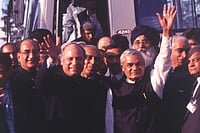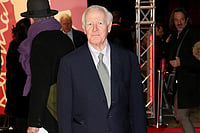Notwithstanding the pain it suffered in the past 10 months, Kashmir is not in rebellion against the idea of India. Kashmiris have developed considerable stakes in India, mingling and even inter-marrying beyond the Banihal Pass they were once averse to crossing. Kashmiri businesses flourish in Delhi, Mumbai, Goa, Kovalam and some other places. There is no love lost for Pakistan; at best, Kashmir would have been another Bangladesh in Pakistan. So Kashmir is not going anywhere; Kashmiris have nowhere to go. Kashmir
cements the idea of India.
But we have never tried to understand Kashmir and its psychological complexities, or address them in the long term. We deal with the problem on an ad hoc basis—currently in the most muscular manner—believing Pakistan to be solely responsible for all that is wrong there. So the Kashmiri feels like an alien in his own land and suffers from a siege mentality. His relationship with Delhi has always been frayed.
For 450-odd years since the Mughal times—except for brief periods before 1987, during Sheikh Abdullah’s terms as J&K’s prime minister or his son Farooq Abdullah’s first term as CM—Kashmiris have never felt a part of the government. Sheikh was locked up in 1953 and Farooq dismissed in1984. Rulers in Kashmir have been seen as little more than puppets of Delhi.
Currently, there is effectively no state government, with rampant hooliganism in every form. Mufti Mohammad Sayeed’s ‘healing touch’ has long since disappeared and he is looked upon instead as the collaborator responsible for most of Kashmiri’s present-day ills. Sufism and Kashmiriat have almost disappeared. Two pillars of Kashmiri Islam—Sheikh Nuruddin Wali, fondly referred to as Nund Rishi, and Mir Syed Ali Hamdani—have been forgotten. Last year, the 700th anniversary of Hamdani was celebrated in a big way in Tajikistan, but not in Kashmir.
Radicalism is growing rapidly, largely due to the permanent conflict in Kashmir. Mirwaiz Mirwaiz Umer Farooq and Yasin Malik have got together with S.A.S Geelani on Pakistan’s instruction because Delhi does not engage even with moderates. When a problem festers, as has happened with Kashmir, extraneous elements get tagged. Pakistan, which had lost out in Kashmir, is back again in a big way since the turmoil last summer. We must ensure that nothing is done to invite the international community back again as in 1989-90 when Kashmiri insurgents were referred to by the West as freedom fighters.
While acknowledging Maratha, Tamil, Telugu, Bengali and Sikh sub-nationalism, we unnecessarily look upon Kashmiri sub-nationalism with suspicion. The threat from so-called separatists is likewise exaggerated. The bus from Srinagar to Muzzafarabad had eased the Kashmiri feeling of siege. The solution to Kashmir lies, as Farooq says, on the Line of Control, with internal autonomy for the state.
Indian interests are too deeply entrenched to let go of Kashmir. The Indian State is big enough to accommodate a Muslim-majority state within the Union. Article 370 should never to be tinkered with.
(The writer is a former RA&W chief.)
























